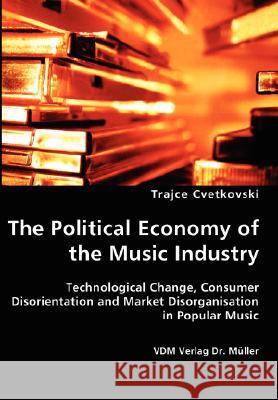The Political Economy of the Music Industry » książka
The Political Economy of the Music Industry
ISBN-13: 9783836428545 / Angielski / Miękka / 2007 / 244 str.
Major firms currently control over 80% of global sound carrier and publishing revenue in the popular music industry. The aim is to explain the disorganising effects currently being experienced. The central question guiding this investigation asks: what will be the effect of new technologies on the future organisation of the music industry? Focus is broadly on recent universally accessible digital technologies which have raised questions about the future of the industry's current organisational structure and processes both in terms of input (creation of music products in their commodified form) and output (access and consumption of music products). The industry's processes are complex because they centre around sophisticated management, and aggressive appropriation of intellectual property (namely copyright) for repeated exploitation for decades after its initial acquisition. The purpose of this book, therefore, is to examine not only the tangible aspects of the manner in which the industry organises its products, but also the intangible dimension. Significant recent changes experienced by the industry are identified. The literature is not conclusive in terms of explaining these developments. This book remedies this deficiency by proposing four separate but interconnected factors are affecting the highly concentrated status quo. Empirically grounded, the current work has implications for understanding the industry's methods. The book is written as a text about the political economy of the music industry specifically and popular culture generally. It is intended to appeal to students and other persons interested in the music industry, political economies in late capitalism, popular culture and mass communication, organisational studies, the politico-economic structure of corporations in advanced capitalist societies, and legal issues concerning popular culture in the market place. At a more general level, this book would appeal to any persons interested in a topic concerning the music business. The book takes a multidisciplinary approach to a widely debated topic in various fields including political science, communications, sociology, law and economics.
Major firms currently control over 80% of global sound carrier and publishingrevenue in the popular music industry. The aim is to explain the disorganisingeffects currently being experienced. The central question guiding thisinvestigation asks: what will be the effect of new technologies on the futureorganisation of the music industry? Focus is broadly on recent universallyaccessible digital technologies which have raised questions about the future ofthe industrys current organisational structure and processes both in terms ofinput (creation of music products in their commodified form) and output(access and consumption of music products). The industrys processes arecomplex because they centre around sophisticated management, andaggressive appropriation of intellectual property (namely copyright) for repeatedexploitation for decades after its initial acquisition. The purpose of thisbook, therefore, is to examine not only the tangible aspects of the manner inwhich the industry organises its products, but also the intangible dimension.Significant recent changes experienced by the industry are identified. Theliterature is not conclusive in terms of explaining these developments. Thisbook remedies this deficiency by proposing four separate but interconnectedfactors are affecting the highly concentrated status quo. Empirically grounded,the current work has implications for understanding the industrys methods.The book is written as a text about the political economy of the music industryspecifically and popular culture generally. It is intended to appeal to studentsand other persons interested in the music industry, political economies in latecapitalism, popular culture and mass communication, organisational studies,the politico-economic structure of corporations in advanced capitalist societies,and legal issues concerning popular culture in the market place. At a moregeneral level, this book would appeal to any persons interested in a topicconcerning the music business. The book takes a multidisciplinary approach toa widely debated topic in various fields including political science, communications,sociology, law and economics.











